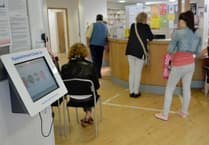FARNHAM doctors have this week urged parents to get their children inoculated with the MMR vaccine following the release of new figures by the Health Protection Agency showing a rise in reported measles cases.
Surrey Primary Care Trust has issued a warning in the wake of the findings, saying that there have been more outbreaks than usual because parents are refusing to have their children vaccinated.
The latest information shows that uptake of the MMR jab for Surrey children is "worryingly low" say the PCT, with only 59 per cent of the county's youngsters being fully protected.
"I think this is a national problem but having a large student population will give Farnham a higher number of cases than other areas," she said.
"The feeling that the vaccine could be linked to autism hasn't gone away and the big problem is that people don't realise how dangerous and serious measles is until they end up catching it.
"It is absolutely essential that people have the vaccine and any students who feel as though they may need it should make an appointment with their nurse - there is plenty of it and it's free."
Another Farnham doctor, Agnes Ibrahim from the Farnham Dene practice, said that older children could be at greater risk.
"What we are seeing in our practice is that the uptake is now getting a bit better among two-year-olds but there are a lot of older children who have not been vaccinated at all," she explained.
"If a child contracts measles it can have very serious consequences that can be lifelong. There is no evidence at all to suggest that the MMR vaccine is linked with autism."
She went on to say that students at the University for the Creative Arts in Farnham could be at risk as they may not have been inoculated.
"We had an epidemic of mumps at the University not that long ago because some students haven't had their MMR vaccine. It is the students and the older children who are most at risk from contracting measles."
With the reduction in percentage of people fully vaccinated, what is known as herd immunity disappears and the risk of a measles epidemic increases.
Dr Peter Robinson, senior partner at The Ferns Medical Practice, said: "If anyone is unsure whether they have been vaccinated, they should check with their own surgery. Measles is a highly infectious disease and can be very unpleasant with potential serious complications. We have been writing to our patients who are not vaccinated but the response so far has been disappointing. I would urge everyone to take this opportunity to make sure that they are vaccinated."
At present, practices across Surrey are running an MMR vaccination catch-up campaign for those under the age of 18.
Director of public health for Surrey, Dr Ruth Milton, said that there is a "common myth" about measles being a run-of-the-mill childhood illness that can be easily treated.
This misinformation is often combined with health scare horror stories in the press that lead many parents to take the decision not to have their children vaccinated.
"What people don't realise is that measles can be very serious and even fatal," Dr Milton warned.
"As parents we all try to do what we can to keep our children safe and by having them immunised against measles, mumps and rubella we can protect them from infections that can lead to serious complications.
"Measles is highly infectious and spreads quickly among children who haven't been protected with the MMR jab so it's very worrying to think that not all children are being immunised and receiving the full two doses needed for maximum protection."
She went on to say that one in every 15 children who catches measles will develop serious complications including chest infections, swelling of the brain and even brain damage.
"I can't stress enough that the MMR immunisation is the most effective and safe way we can protect our children. If there are parents out there who, for whatever reason, haven't already had their children immunised I would encourage them to make an appointment with their GP as soon as possible."
Children aged over 12 months can be vaccinated as part of the routine immunisation programme and the full MMR vaccination schedule comprises two doses, the second being given 28 days after the first.
In line with the national catch-up campaign, anyone under the age of 18 who hasn't had the vaccine can now be vaccinated by their GP, giving them a second chance to be protected.
For more information about the MMR vaccine, visit http://www.mmrthefacts.nhs.uk">www.mmrthefacts.nhs.uk.


.jpeg?width=209&height=140&crop=209:145,smart&quality=75)
